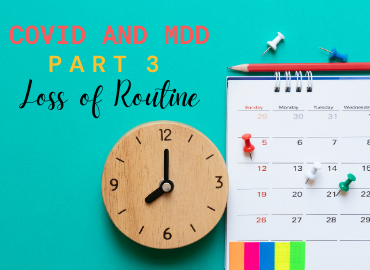When the World Turns Upside Down
Check out our other posts on COVID and mental health here and here, where we talk about the general connection and the effects of isolation.
Today, we want to look at the effects of the loss of routine stemming from the COVID-19 fallout. Loss of routine can be caused by losing one’s job, having to get a different job, working from home, having to get alternate schooling, or taking on additional responsibilities like day-long childcare.
A “Normal” Day
The NCBI has two main definitions of routine: primary and secondary. Primary routines make up the essentials, like eating, sleeping, and washing. Secondary routines are more individual and include activities like exercising, waking up at a certain time, or picking children up from school. Any of these can be disrupted by the pandemic and quarantine. Someone forced to quickly pick up new employment might have their circadian rhythm disrupted, and someone else who loves to go to the gym will have to find a workout space and equipment elsewhere.
Effects of Routine Loss
According to Ramon Solhkhah, M.D., chair, Department of Psychiatry, Jersey Shore University Medical Center, “While many of us complain about how busy our schedules are, it represents expectations and patterns that are an important component of good mental health. The pandemic has left many people feeling adrift because those daily routines that were essential to us before the COVID-19 crisis have evaporated and been replaced by uncertainty and a lack of structure that can contribute to stress, anxiety and even clinical depression.”
Our identity is often intertwined with our routines, as our actions are dictated by our choices and our choices are a reflection of who we are. When our routines are disrupted, we feel anxious because we feel like we’re supposed to be doing something we’re not, or because we aren’t sure what will come next. If someone has a diagnosed mental disorder like MDD, these effects can exacerbate that problem.
Making a New Normal
If you have diagnosed MDD that has worsened because of a loss of routine, you have options. Always talk with your general physician first, and if you have a psychiatrist, talk with them as well. You are welcome to contact us at any time for questions or an appointment. We offer remote services like telepsychiatry and in-person services like transcranial magnetic therapy (TMS). See more about how TMS helps treatment resistant MDD in these pages and our blog.




